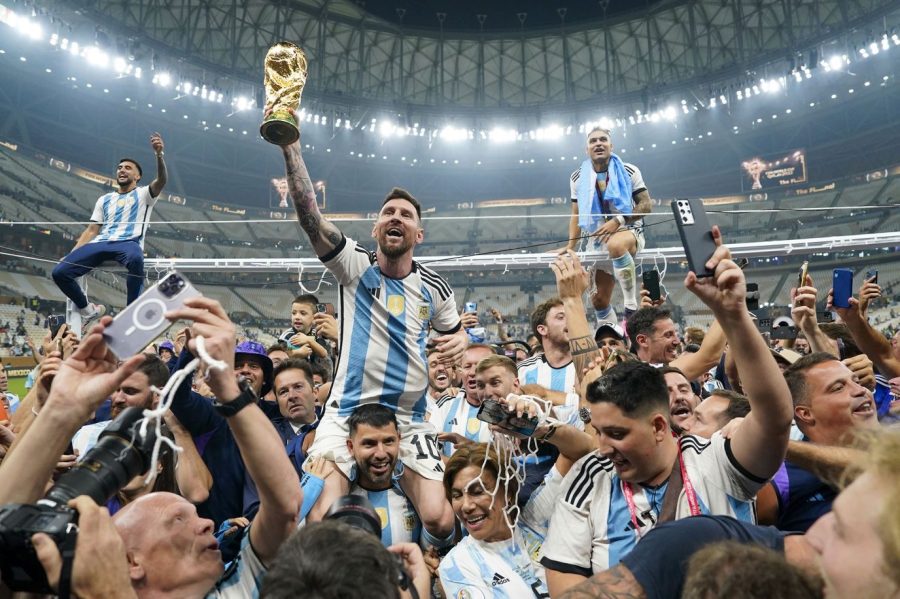I Hate the World Cup
Why I can't wholeheartedly support the World Cup anymore.
February 18, 2023
Like most people with TikTok, my For You Page in December was dominated with edits of Lionel Messi to the tune of Taylor Swift’s “You’re On Your Own, Kid” and dramatic clips posted by the official FIFA World Cup account. Despite not really caring about soccer, I found myself closely watching the games while I was in Aymar. However, none of these experiences changed my fundamental opinion about the World Cup.
I hate the World Cup.
I’ve written about it before, but let me say it again: Sports culture enables violence because of its intrinsic link to toxic masculinity. The very nature of being an avid sports fan is often synonymous with being physical, but this doesn’t matter when the physical is just patting a buddy on the back when your team scores a goal. This nature becomes problematic when physical excitement crosses the clear line into physical violence. There’s no better time to understand the true impacts of sports culture than now through an analysis of our world during and after the latest World Cup.
A 2014 study (Full Fact) found that when England lost a match, domestic abuse cases reported to the Lancashire police increased by 38% when compared to when there was no match. Furthermore, the number of reports increased by another 26% when England won or the match resulted in a draw. It must be noted that this study is small and focused primarily on Lancashire, but this statistic is not an abnormality. The results of the World Cup are intrinsically linked to violent reactions. When the Australian soccer team, the Socceroos, lost, the stadium erupted into violence as fans began throwing flares onto the pitch and injured security guards and referees. Former Socceroo Craig Foster noted, “To see this, it’s kind of like going from heaven to hell for a moment” (BBC). We find ourselves consumed by emotion when our favorite team loses—a valid reaction—but sports culture empowers us to take this emotional response and turn it into a physical one. Even before matches happen, violence often breaks out. The streets of Qatar became the ring for many fights between fans of the Argentinian and Mexican teams days before the match even began (Express). It’s clear that the violence associated with sports culture is a very real threat in our society.
Violence is not the only threat associated with this specific World Cup either.
The 2022 World Cup was hosted by Qatar, a country notorious for violating basic human rights. Even though it was decided in 2010 that the 2022 World Cup would be hosted by Qatar, refusing to change that decision automatically condones the actions of the host country. The 2022 World Cup didn’t just condone Qatar’s malicious actions, it contributed to them. In fact, the building of the World Cup stadiums added to Qatar’s already lengthy record of human rights violations. Approximately 30,000 immigrant workers from Bangladesh, India, and Nepal arrived in Qatar to build the World Cup stadiums that we all saw on TV. At least 37 workers died while constructing them (The Conversation). The International Labor Organization (ILO) did their own research in Qatar by tracing data from government-run hospitals and ambulance services in the country. The ILO discovered that 50 migrant workers died, 500 workers were seriously injured, and 37,600 others suffered mild to moderate injuries in just 2021 (BBC). Many of us may not have known it, but we were watching games take place in a stadium that literally took lives. The Qatari government did nothing to fix the dangers associated with this project and instead denied the allegations of worker abuse.
Furthermore, allowing Qatar to host the World Cup indicates a silent support of their constant discrimination towards women and the LGBTQ+ community. In Qatar, women’s lives are governed by their male guardians who can dictate their ability to study, travel, and even drive. Writing an article like this for someone who looks like me in Qatar would be virtually impossible as a result of this oppressive state. The dress codes and constant discrimination against women in Qatar actually resulted in fewer women traveling to Qatar to watch the World Cup live (Metro), a clear indication of the values upheld by the 2022 World Cup. When players decided to support the LGBTQ+ community by wearing “One Love” armbands during the tournament, Fifa reminded players of their armband regulations, essentially threatening to take players out of the game if they disobeyed the rules (The Conversation). The players didn’t wear their armbands because they didn’t want to get kicked out of the game and so tacitly accepted these cruel ideologies. As human rights activist Ginetta Sagan said, “Silence in the face of injustice is complicity with the oppressor” (Guardian).
Supporters of the World Cup must be aware of the disastrous effects of it. Even though the World Cup has the power to unite an entire country, it has also been a tool for division. I hate the World Cup because of the violence, hatred, and cruelty that it supports.
